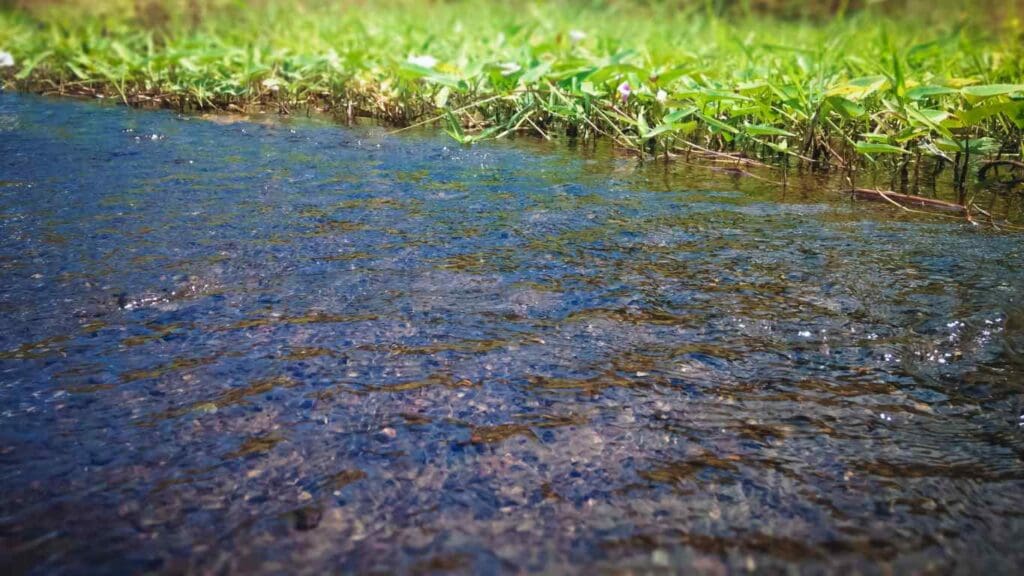If you’re a koi pond owner, you may be wondering if rainwater is good for your pond. Rainwater is a natural source of freshwater that can help balance the pH levels of your pond and provide essential nutrients for your koi fish. However, there are also potential risks associated with using rainwater in your pond.
It’s important to understand the role of rainwater in maintaining a healthy koi pond. Rainwater can help replenish oxygen levels in your pond, which is crucial for the health of your fish. Additionally, rainwater can help flush out any excess nutrients or toxins that may have accumulated in your pond. However, if the rainwater is contaminated with pollutants or chemicals, it can harm your fish and plants.
Is Rain Water Good for Koi Ponds- Core Insights:
The Importance of Rain Water for Koi Ponds
Rainwater is an essential source of fresh and clean water for your koi pond. It is free from the chemicals found in tap water, such as chlorine and chloramine. These chemicals are commonly used to treat tap water and can be harmful to fish if not properly neutralized. By using rainwater, you eliminate the risk of exposing your koi to these potentially harmful substances.
Moreover, rainwater is a natural source of oxygen for your koi pond. When it rains, the water surface is agitated, allowing the oxygen in the air to mix with the pond water. This replenishes the oxygen in the water, which is essential for the survival of your koi fish.
Rainwater is also beneficial for maintaining the pH balance of your koi pond. Tap water often has a high pH level, which can be harmful to koi fish. Rainwater, on the other hand, has a natural pH balance that is ideal for koi fish. It is free from any harmful chemicals that can cause fluctuations in the pH level of the pond water.
Furthermore, rainwater can be aesthetically pleasing for your koi pond. It can create a natural and refreshing environment for your koi fish to thrive in. However, it is important to ensure that the rainwater is clean from any pollutants or debris that can harm your koi fish. You can use a rain barrel or a filtration system to collect and filter the rainwater before adding it to your koi pond.
Overall, rainwater is a valuable resource for your koi pond. It is a natural source of fresh and clean water that is essential for the health and well-being of your koi fish. By using rainwater, you can provide your koi fish with a natural and healthy environment to thrive in.
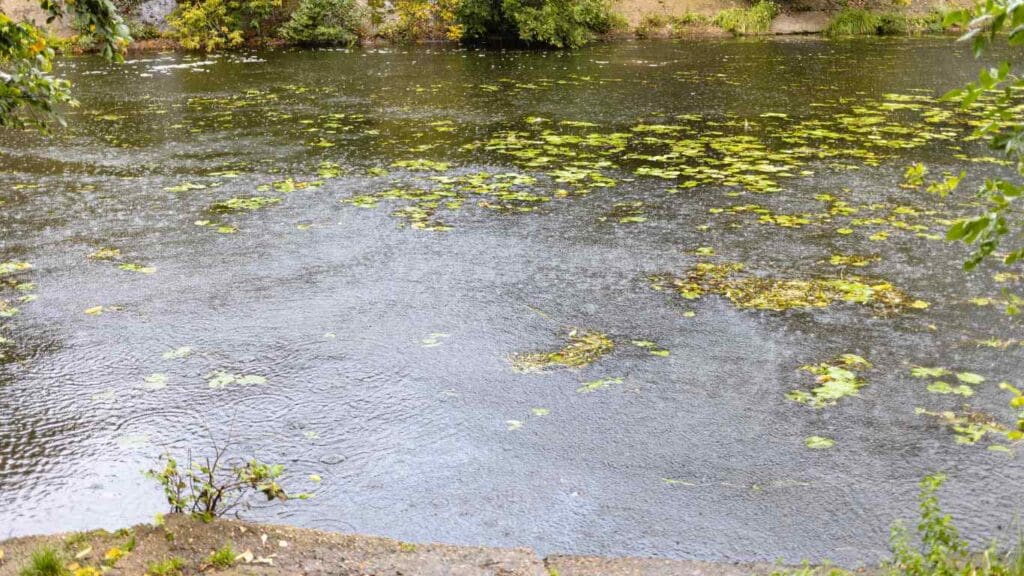

The Role of Rain Water in Balancing Pond pH
Rainwater can play an important role in balancing the pH of your koi pond. The pH level of your pond can be affected by many factors, including the type of soil in your area, the amount of sunlight your pond receives, and the type of fish and plants in your pond. When the pH level of your pond is too high or too low, it can be harmful to your koi fish and other aquatic life.
Rainwater is generally good for koi ponds as it is a source of fresh and clean water. When it rains, koi fish are able to get more oxygen because the rain replenishes the oxygen in the water. Additionally, rainwater can help to balance the pH level of your pond by diluting any acidic or alkaline substances that may be present in your pond.
However, it’s important to note that the pH level of rainwater can vary depending on the location and the amount of pollution in the air. Acid rain, which is caused by pollution in the atmosphere, can be harmful to your koi fish and other aquatic life.
To ensure that your pond’s pH level remains balanced, it’s important to monitor the pH level of your pond regularly and make adjustments as needed. You can use a pH test kit to measure the pH level of your pond water. The optimum range for pond water for fish health is 6.5-9.0, though they can survive in a range of 4.5 to 9.
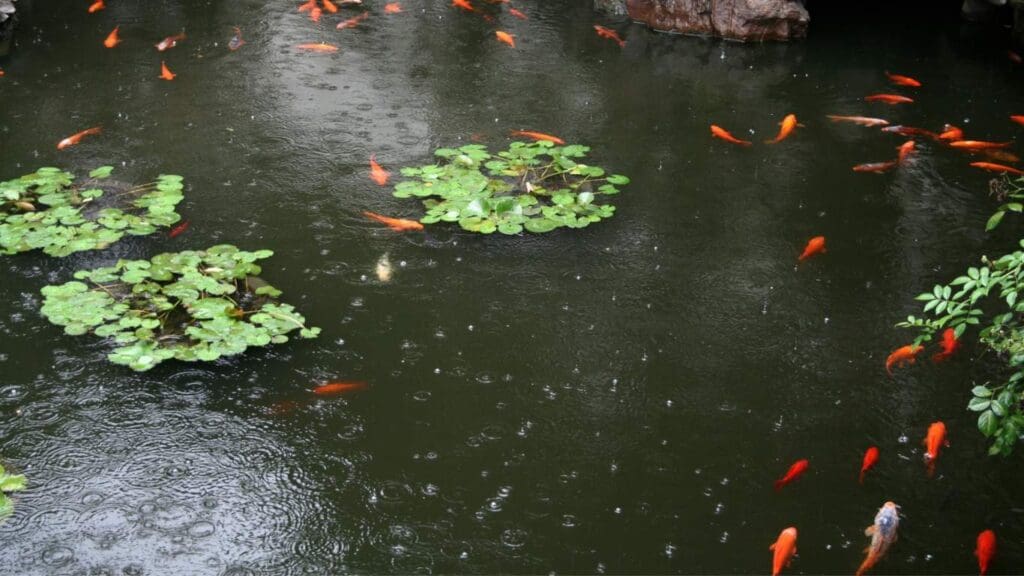

If you notice that the pH level of your pond is too high or too low, you can make adjustments by adding pH balancers or buffer solutions to your pond water. It’s important to follow the instructions carefully when adding these products to your pond, as adding too much can be harmful to your koi fish and other aquatic life.
In brief, rainwater can play an important role in balancing the pH level of your koi pond. However, it’s important to monitor the pH level of your pond regularly and make adjustments as needed to ensure the health and well-being of your koi fish and other aquatic life.
Nutrient Content in Rain Water
Rainwater is an excellent source of nutrients for koi ponds. It contains essential minerals and trace elements that are beneficial for the growth and health of koi fish. Rainwater is also free of harmful chemicals and additives that are commonly found in tap water.
Here are some of the nutrients that are present in rainwater and their benefits for koi ponds:
- Nitrogen: Rainwater contains nitrogen in the form of nitrates and nitrites. These nutrients are essential for the growth of algae and other aquatic plants, which provide food and shelter for koi fish.
- Phosphorus: Phosphorus is another important nutrient that is present in rainwater. It promotes the growth of healthy plants and algae, which in turn provide a natural food source for koi fish.
- Potassium: Potassium is a mineral that is essential for the growth and development of koi fish. It helps to regulate water balance in the body and is important for maintaining healthy skin, scales, and fins.
- Calcium: Calcium is a vital nutrient that is necessary for the development of strong bones and teeth in koi fish. It also plays a role in regulating muscle function and maintaining healthy blood pressure.
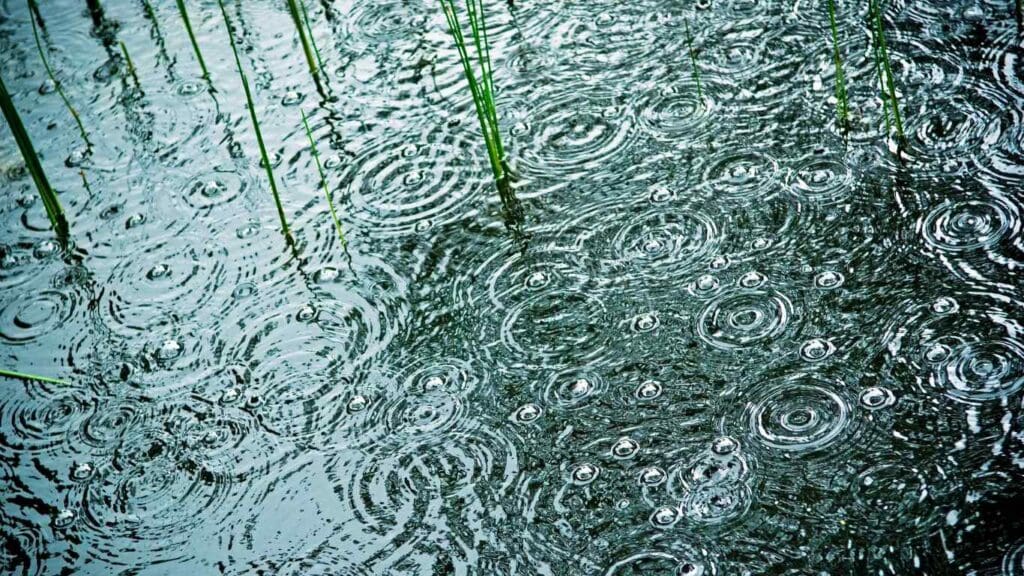

Overall, rainwater is a valuable source of nutrients for koi ponds. However, it is important to note that the nutrient content of rainwater can vary depending on the location and environmental conditions. It is recommended to test the water regularly and make adjustments as necessary to maintain optimal water quality for your koi fish.
Rain Water and Oxygen Levels
When it comes to koi ponds, oxygen levels are crucial for the health and survival of your fish. Rainwater can have both positive and negative effects on oxygen levels in your pond.
On the positive side, rainwater can replenish the oxygen in your pond. This is because rainwater is typically cooler than the water in your pond, which can help to increase the amount of dissolved oxygen. Additionally, rainwater can help to circulate the water in your pond, which can also increase oxygen levels.
Salifert Dissolved Oxygen Test Kit
$14.89 in stock
However, it’s important to note that rainwater can also have negative effects on oxygen levels. If your pond is already low on oxygen, heavy rainfall can cause the water to become diluted and reduce the overall oxygen concentration. Additionally, if the rainwater is highly acidic, it can lower the pH levels in your pond and cause stress to your fish, which can in turn reduce oxygen levels.
To ensure that your pond has enough oxygen, it’s important to regularly monitor the levels and take action if they fall too low. A dissolved oxygen concentration of at least 6 ppm is recommended for healthy koi, with levels up to 8 ppm being optimal. You can use a dissolved oxygen test kit to measure the levels in your pond and take steps such as adding an aerator or increasing water circulation to boost oxygen levels if necessary.
In brief, rainwater can have both positive and negative effects on oxygen levels in your koi pond. While it can help to replenish oxygen, it’s important to monitor levels and take action if necessary to ensure the health and survival of your fish.
Potential Risks of Rain Water
While rainwater can be beneficial for koi ponds, it can also pose some potential risks. Here are some things to keep in mind:
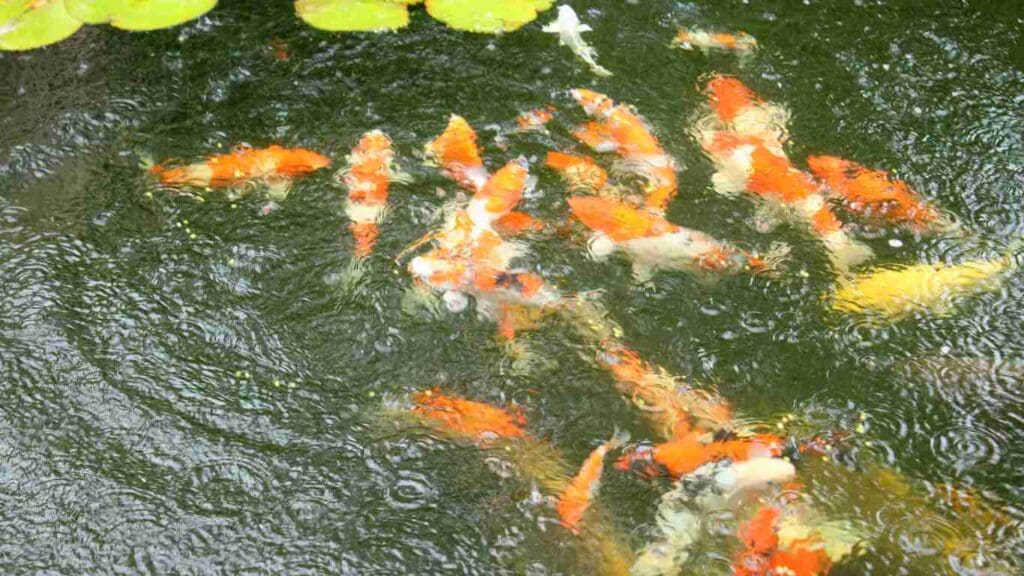

Dilution of Water Quality
Heavy rainfall can dilute the water quality in your koi pond, especially if the pond is small. Rainwater can contain pollutants such as acid rain, pesticides, and other chemicals that can harm your koi fish. As such, it is important to monitor the pH levels of your pond after a heavy rain and perform water changes accordingly.
Temperature Fluctuations
Rainwater can cause temperature fluctuations in your koi pond, especially if the pond is shallow. Large amounts of rainwater can cause the water temperature to drop rapidly, which can be harmful to the fish. It is important to monitor the water temperature after a heavy rain and take steps to regulate it if necessary.
Flooding and Erosion
Heavy rainfall can cause flooding and erosion, which can damage your koi pond and make it unsafe for your fish. It is important to have a drainage system in place so that excess water can be quickly removed from your pond during heavy rains. You should also avoid putting your koi pond in an area where it is likely to flood.
Turbidity
Rainwater can cause the water in your koi pond to become muddy and turbid, which can inhibit your fish’s ability to see and breathe. This can eventually lead to health problems and even death. To prevent this, it is important to perform regular water changes and maintain good water quality in your pond.
Overall, while rainwater can provide a free source of soft water for your koi pond, it is important to be aware of the potential risks and take steps to mitigate them.


How to Safely Use Rain Water
Using rainwater in your koi pond can be a great way to provide fresh and clean water for your fish. However, it is important to ensure that the rainwater is safe to use. Here are some tips on how to safely use rainwater in your koi pond:
- Collect the rainwater in a clean container: Make sure the container you use to collect the rainwater is clean and free of any contaminants. You can use a rain barrel or a similar container that is designed for collecting rainwater.
- Test the pH level: Test the pH level of the rainwater before adding it to your pond. The pH level of rainwater can vary depending on where you live and other factors. Ideally, the pH level should be between 7 and 8, which is the optimal range for koi fish.
- Filter the rainwater: Use a filter to remove any debris or contaminants from the rainwater before adding it to your pond. This will help ensure that the water is clean and safe for your fish.
- Use rainwater in moderation: While rainwater can be a great source of fresh water for your pond, it is important to use it in moderation. Too much rainwater can cause fluctuations in the pH level and other water parameters, which can be harmful to your fish.
By following these tips, you can safely use rainwater in your koi pond and provide your fish with fresh and clean water.
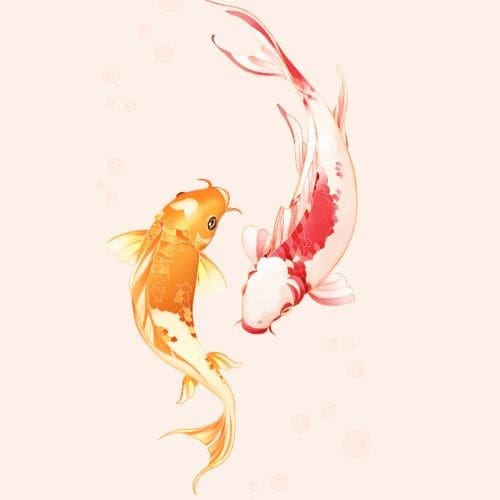

Get the Information You Need Direct from Koi Pond Experts
Join Now!
Final Remarks
In brief, rainwater can be beneficial for koi ponds as it is a source of fresh and clean water. However, it is important to note that the overall composition of the rainwater can impact the pond’s pH and chemistry levels. This raises the question, “Is Rain Water Good for Koi Ponds?” when considering its effect on pond chemistry.
If you have an established pond with an aeration and circulation system, rainwater can safely dissolve with the existing pond water and become part of the ecosystem. It is recommended to monitor the pH levels after a heavy rain and make water changes accordingly. Again, this brings us to consider “Is Rain Water Good for Koi Ponds?” in the context of maintaining a balanced ecosystem.
Using rainwater can also eliminate the risk of exposing your koi to harmful chemicals found in tap water, such as chlorine and chloramine. However, it is important to note that rainwater is not pure and can contain pollutants from the environment. This means that while rainwater can be a natural and beneficial addition to your koi pond, it is essential to test and treat it as needed to ensure the health and safety of your koi.
Overall, incorporating rainwater into your koi pond can be a beneficial addition as long as you monitor and maintain the pond’s chemistry levels. With careful management, rainwater can contribute positively to your koi pond’s ecosystem, answering the question, “Is Rain Water Good for Koi Ponds?” in the affirmative, with some caveats.
Frequently Asked Questions
Can rain water cause pH imbalances in a koi pond?
Rainwater can affect the pH level of a koi pond, especially if the water is acidic. Generally, rainwater is slightly acidic due to the presence of carbon dioxide in the atmosphere. However, the pH level of rainwater can vary depending on the location and weather conditions. To prevent pH imbalances, it is important to test the water regularly and adjust it accordingly.
Does rain water contain harmful pollutants for koi?
Rainwater can contain pollutants such as chemicals, debris, and nitrates from fertilizers or other lawn care products. The quality of rainwater varies depending on the location and weather conditions. Therefore, it is important to monitor the water quality and take appropriate measures to ensure the health of your koi.
How can I prepare my koi pond for heavy rain?
To prepare your koi pond for heavy rain, you can take the following measures:
- Ensure that the pond has proper drainage to prevent overflowing and flooding.
- Remove any debris or leaves from the pond to prevent clogging of the filters.
- Cover the pond with a net to prevent any debris or pollutants from entering the water.
Can rain water help oxygenate a koi pond?
Rainwater can help oxygenate a koi pond by replenishing the oxygen in the water. However, it is important to note that rainwater alone cannot provide sufficient oxygen for the koi. Proper aeration and filtration systems are necessary to maintain the optimal oxygen levels in the pond.
What is the ideal pH level for a koi pond?
The ideal pH level for a koi pond is between 7.0 and 8.0. A pH level outside of this range can cause stress and health problems for the koi. It is important to monitor the pH level regularly and adjust it accordingly.
How often should I test the water quality in my koi pond?
You should test the water quality in your koi pond at least once a week. Regular testing can help you detect any changes in the water quality and take appropriate measures to maintain a healthy environment for your koi.
 1 (509) 228-8646
1 (509) 228-8646


